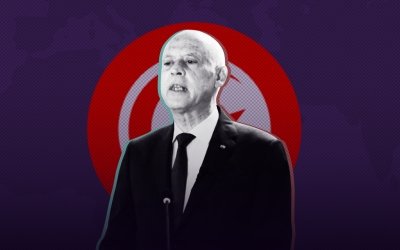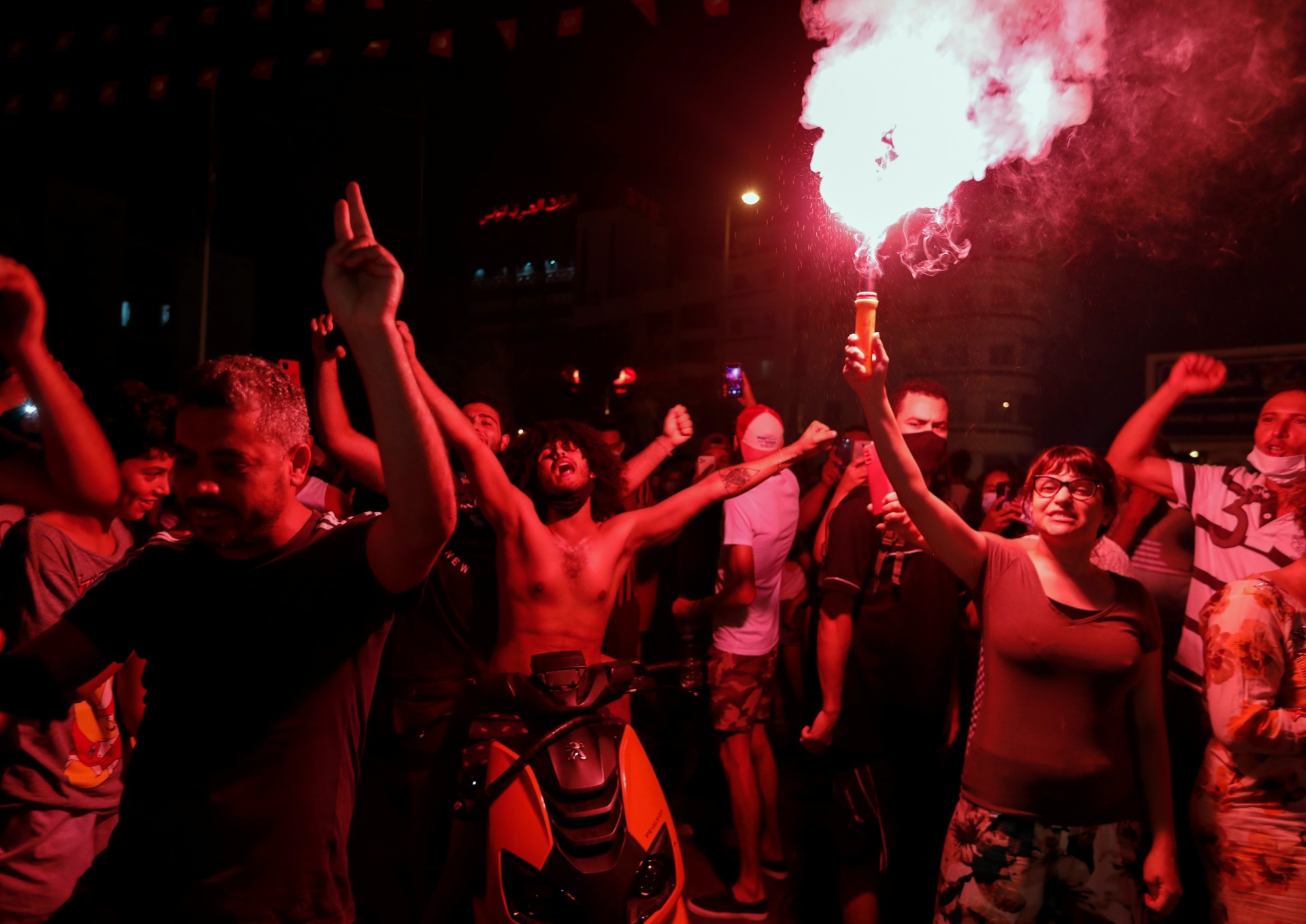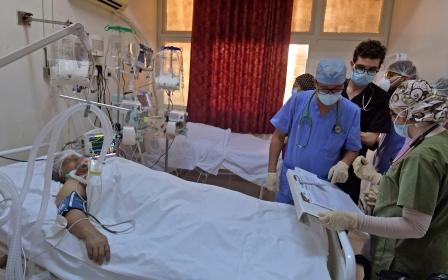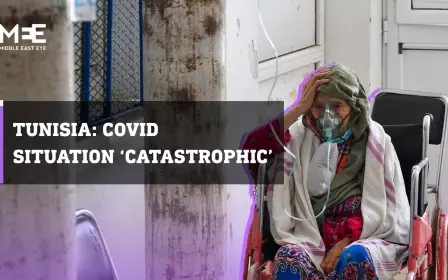Tunisia: President Saied sacks PM, freezes parliament, amid violent anti-government protests
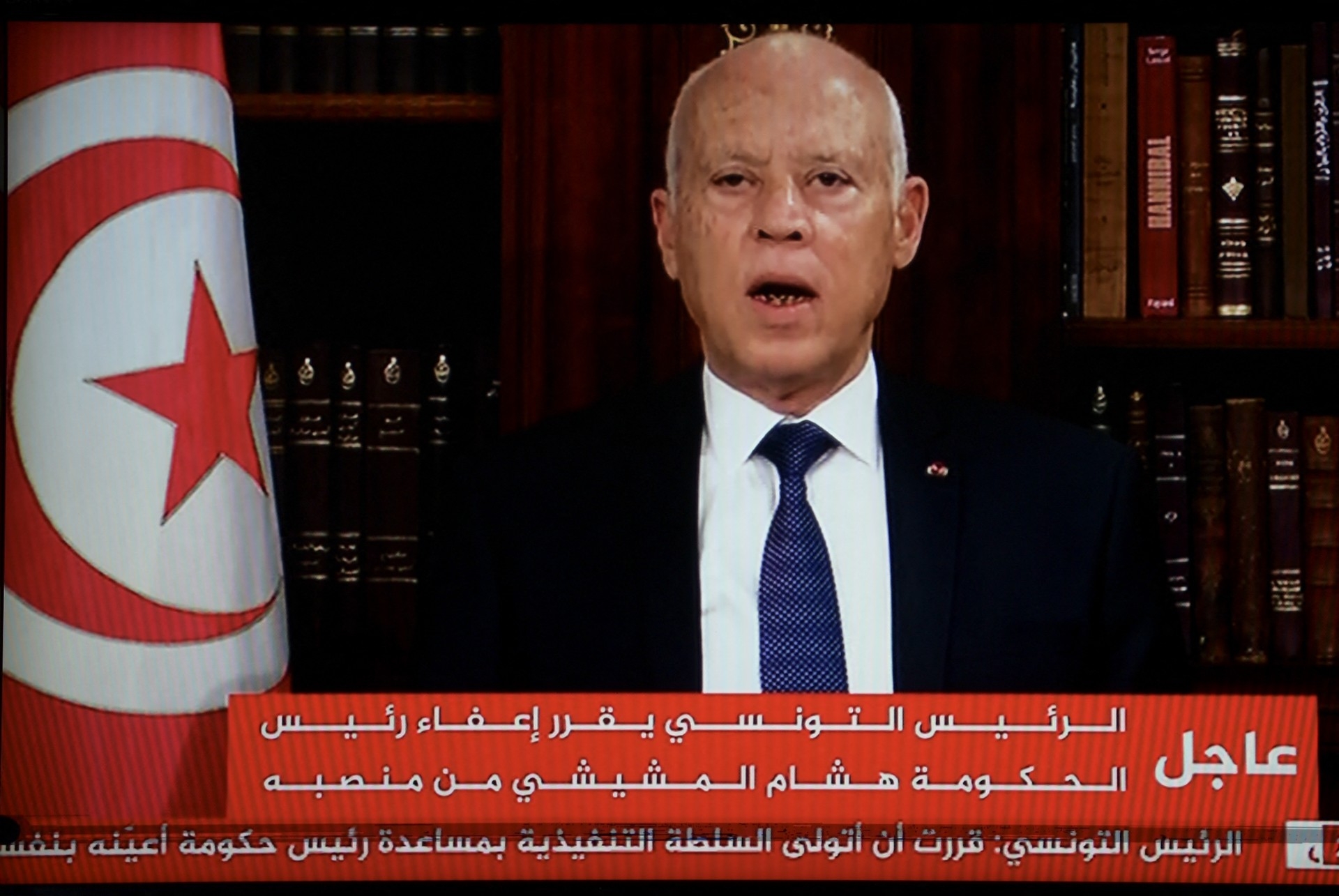
Tunisia's President Kais Saied on Sunday announced that he was freezing parliament, suspending the immunity of all MPs and dismissing Prime Minister Hichem Mechichi, after protests rocked several Tunisian cities.
The president’s actions come two months after Middle East Eye revealed a letter written by Saied’s advisers urging him to seize control of the country using Article 80 of constitution, which he now has.
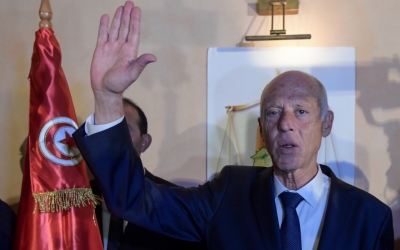
New MEE newsletter: Jerusalem Dispatch
Sign up to get the latest insights and analysis on Israel-Palestine, alongside Turkey Unpacked and other MEE newsletters
On Sunday night, Saied said that he would now assume the presidency of the executive authority with the assistance of a new prime minister.
In response, Tunisian Parliament Speaker Rached Ghannouchi accused Saied of launching "a coup against the revolution and constitution".
"We consider the institutions to be still standing and supporters of Ennahda and the Tunisian people will defend the revolution," Ghannouchi, who heads the moderate Islamist Ennahda Party, added, raising the prospect of confrontations between supporters of his party and Saied.
Saied said that his actions were in line with Article 80 of the constitution, and also cited the article to suspend the immunity of members of parliament.
In the letter revealed by MEE in May and labelled “absolutely top secret”, Saied was advised to summon Mechichi and Ghannouchi to the presidential palace and announce that he would be enacting Article 80, which allows the president to seize powers in a national emergency.
The document stated that neither the prime minister nor the speaker would be allowed to leave the palace. This would be accompanied by a wave of arrests of leading politicians.
Sunday’s announcement went further than the plan outlined in May, however, in that the president announced he had fired Mechichi and suspended parliament - neither of which it is in his power to do under the constitution. According to Tunisia's constitution, when Article 80 is invoked, parliament is forced into continuous session, and cannot be dissolved.
'We consider the institutions to be still standing and supporters of Ennahda and the Tunisian people will defend the revolution'
- Parliament Speaker Rached Ghannouchi
The roadmap set out in the constitution once Article 80 is triggered depends on the constitutional court. However, Saied has blocked parliament's attempts to set up the court, which would be the first of its kind in the Arab world.
In May, the president was forced to acknowledge he received the letter but denied he had any intention to mount what was called at the time a “constitutional coup”.
Middle East Eye understands the plan to seize power fell apart that month when it failed to get the backing of Tunisia’s security forces, who issued a statement saying they would not involve themselves in the political process.
Sunday’s announcement was carried out in the presence of uniformed officers but it is not known whether they explicitly backed his actions.
The extent of support for Saied's moves against a fragile government and divided parliament was not clear and the president warned against any violent response.
"I warn any who think of resorting to weapons… and whoever shoots a bullet, the armed forces will respond with bullets," Saied said in a statement carried on television.
Hours after the statement, military vehicles surrounded the parliament building as people nearby cheered and sang the national anthem.
There were scenes of jubilation late on Sunday night across the capital, as many Tunisians broke curfew to celebrate Saied's announcement, waving Tunisia's crimson national flag and honking car horns.
"We are so excited and very enthusiastic about the future, it was totally unexpected - as you can see there are people here in their pyjamas!" Nadia, a 23-year-old student, told MEE, as she watched the fireworks and flares.
"This is amazing, I don't want to be controlled by Ennahda or thieves anymore," said Yassine, 20.
Ennahda headquarters set on fire
Earlier on Sunday, hundreds of protesters had rallied in Tunis and other cities, demanding that the government step down after a spike in Covid-19 cases that has aggravated economic troubles.
The pandemic has hit Tunisia hard as it struggles to lift an economy that has suffered since its 2011 revolution, with unemployment surging and state services declining over the past decade.
In the capital, police used pepper spray against protesters who threw stones and shouted slogans demanding that Mechichi quit and parliament be dissolved.
Witnesses said rallies numbering several hundred also gathered in the cities of Gafsa, Sidi Bouzid, Monastir and Nabeul. Demonstrators in Sousse tried to storm the local headquarters of Ennahda, the biggest party in parliament. In Tozeur, protesters set fire to the party's headquarters.
In Tunis, more than a thousand, mostly young, Tunisians turned out to demand political change and express their anger over the government’s catastrophic handling of the coronavirus pandemic, despite the 42C heat and a strict weekend lockdown across the capital.
“My blood is boiling today, this government has failed us again and again,” one 28-year-old protester, wearing a rainbow bandana, told MEE, asking that her name be withheld due to security concerns.
'From 2011, every protest is a new revolution'
Another protestor, Hichem Bouzid, an artist, told MEE: “Like everyone I came out today to stand against the government and the parliament… Is today a new revolution?
"From 2011, every protest is a new revolution. We made a protest to push a dictator out, we replaced him with people who were fresh from jail - every protest, every movement can change the system.”
Last week, Mechichi sacked the health minister after chaotic scenes at walk-in vaccination centres during the Eid al-Adha holiday, where large crowds queued for inadequate supplies of vaccine.
After a year of wrangling with Mechichi and Ghannouchi, Saied declared the army would take over the pandemic response.
Some analysts saw the move as an attempt to expand his powers beyond the foreign and military role assigned to the president in the 2014 constitution.
Government paralysis could derail efforts to negotiate an International Monetary Fund loan seen as crucial to stabilising state finances but which could also involve spending cuts that would aggravate economic pain for ordinary people.
Reuters contributed to this report.
Middle East Eye delivers independent and unrivalled coverage and analysis of the Middle East, North Africa and beyond. To learn more about republishing this content and the associated fees, please fill out this form. More about MEE can be found here.


